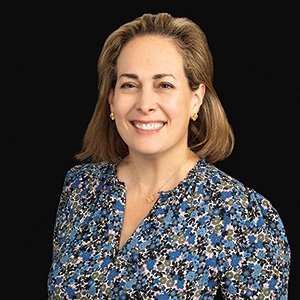Michal Berkner is one of the most distinguished M&A lawyers in Europe, advising on some of the region’s most complex and strategic cross-border transactions in life sciences and tech. She joined Cooley’s London office in 2018 from Skadden, Arps, Slate, Meagher & Flom, where she had practised in M&A for more than 20 years.
Michal’s clients include strategic buyers and sellers and investors in public and private companies ranging in value from multiple millions to billions of dollars.
What does Cooley do as a firm to encourage equitable opportunities for women in M&A? Both for initial career progression, and at senior levels?
Ensuring equal opportunities for all has been core to Cooley’s culture for many years. We have multiple industry-leading diversity, equity and inclusion (DEI) programmes, which are led from the top and encompass everyone in the firm.
Our Women’s Initiative is at the heart of Cooley’s strategy for female career development and focuses on leadership, mentoring and networking. Our mentoring programme includes our Male Allies initiative, a buddy system for men and women lawyers in the office.
We are proud of our approach to DEI and we are pleased with our success – but are not resting on our laurels.
Clients are also increasing their focus on DEI and the promotion of women. Their teams are more diverse and they want to see that reflected in their law firm teams. We’re very pleased to respond to that.
What steps can firms take to create a more inclusive and supportive environment for women in M&A, both at the senior level and throughout the pipeline?
Law firms are working hard in this area, but in M&A the key is empowerment.
As one of the most senior M&A partners in the London office this is very important to me. Half of my team are women and it’s a top priority for me to support and promote our female lawyers, including personally mentoring women associates and junior partners, as well as empowering those on my team with major responsibilities and leadership roles on transactions.
It’s vital that when women take maternity leave, they don’t feel that their career is on hold and that their clients might be given to someone else. Mat-leave doesn’t have to be black or white – if a woman wants to continue to be engaged with certain clients or keep her finger on the pulse of what’s happening internally with the M&A group or with legal developments, I am supportive of her ongoing involvement and help tailor a mat-leave to suit the individual. Women on my team know that I will do everything in my power to ensure that their career is not set back because they chose to have a family. Careers span decades, not years but keeping momentum is very important. After I had children (three girls) I became even more motivated to be a successful M&A lawyer and be a good role model to them. I love my career and never viewed having children as a reason to step back or accept a different career trajectory to my male colleagues. Women can have it all and I do everything I can to make sure there are many more senior M&A women partners when I retire – and I’m sure I will see that.
Why do you think that M&A is a traditionally male-dominated field?
Historically, the perception was that to be a good M&A lawyer you had to have more typically alpha-male type leadership skills, so the practice was probably more attractive to men. Being confident, able to control a room, manage a team, take ownership, understand complex issues, play tough and be a good negotiator, often in highly challenging and time-constrained situations, are key skills for an M&A lawyer. But I don’t think these are exclusively male traits and there are many women who have them in spades.
Are there any specific trends or shifts in the M&A landscape that you believe will create new opportunities for senior women professionals?
Workplaces have become far more inclusive and also no longer tolerate sexist and other bad behaviour the way they did. This makes the working environment, including in M&A, far better for women.
That’s not to say bad attitudes towards women have been eradicated, but when they do occur it’s more likely they will be called out and acted on. As an example, on a recent deal the general counsel at my client had the lead lawyer advising the other side removed from the team because of his patronising behaviour. The lawyer wasn’t a problem for me – I’ve seen it all – but his removal by my client is a sign of the progressive times we live in.
In your opinion, what specific factors contribute to the underrepresentation of senior women in M&A, and what steps can be taken to address this imbalance?
From my observations in M&A, I think the main reason for this is not the structure of law firms – they have worked very hard on making inclusive and supportive cultures, and continue to make that a priority – but more personal or societal factors. The drop-off point often occurs when children arrive and the couple decide which of them is going to prioritise staying at home to focus on child care. It’s a very private decision, but my sense is that family, societal, and cultural pressures often lead to the woman taking the lead on childcare. The situation is improving and I expect that to continue, but it will take time.
What do you consider are the biggest barriers to women in M&A, historically and at the moment?
Historically, it’s been perceived that women don’t possess the alpha-male type skillset to be good M&A lawyers. Thankfully that view about women has definitely changed.
There is no doubt that practising M&A is tough and very demanding, with a 24/7 style intensity during a transaction. The ability to succeed in that environment definitely doesn’t suit everyone – but that applies as much to men as it does to women.
In the last five years, what would you say are the most significant changes for women in M&A?
The big one has been #MeToo, but there has been a far broader societal shift toward equality generally. Increasing flexibility in working practices has also had a major impact. The trend existed before Covid, but the pandemic was transformational and I think the shift to greater levels of flexibility and remote working is permanent. Most of my deals are cross-border and this change applies to those transactions too. Many deals are done on a fully virtual basis – unless there’s an exceptional need, typically there’s no face-to-face contact until the celebration at the end of the deal.
What can firms do to help develop female M&A talent?
It’s all about empowerment and opportunity to work on and ultimately lead transactions within a supportive environment, led by senior M&A partners as mentors.
Firms can first and foremost promote more women attorneys to partners and senior leadership roles within the firm. Having role models within the firm and the greater business community and in turn sponsors and mentors is vital to encouraging women to stay the course and aim for the top. Giving female M&A talent an opportunity to lead on transactions, develop strong client relationships and the support they need to build their businesses is also vital to their development.
Who have been your own personal mentors in your career, and what did they do to encourage your career?
I owe a lot to four senior M&A partners that I have worked with and who have mentored me over my career: David Fox, Nancy Lieberman, who sadly died in April, Scott Simpson, who has also passed away, in 2022, and Michael Hatchard.
All of them were tough and demanding, excellent at their jobs and extremely intelligent. They taught me to set high expectations for myself, to not give up, to learn from my mistakes, and be very prepared for negotiations. They motivated me to become the best lawyer that I could.
I remember David giving me considerable responsibility as an associate and presenting me to clients as a highly capable and trusted colleague. I believed I was, of course – but he also made me step up.
I got to know Nancy very well after she returned to work following a tragic skiing accident that left her paralysed. She was a huge inspiration as she continued to operate at the highest level of deal making for many years following her accident. She was a trailblazer for women in M&A.
Scott and Michael were influential on my professional development in many ways. I worked with both of them for 16 years at Skadden and they taught me to think out of the box, never accept no for an answer and excel at complex, cross-border M&A. They taught me how to work hard and play hard.
Conversely, what were your own personal setbacks? Do you feel that you could have been more supported?
I honestly don’t think I have had any personal set-backs. Obviously every transaction brings plenty of challenges and you need to constantly be generating a pipeline of deals, but that goes with being an M&A lawyer – and that’s what we thrive on.
The environment for women in M&A and generally in law and business is without doubt far better than it was than when I started my career over 25 years ago and it continues to improve. In M&A there are definitely more female associates. We should celebrate all of this, but the fact is that I’m still almost always the only female M&A partner in the room. There is much more to be done.
For more information, please contact:

Michal Berkner, partner
Cooley
22 Bishopsgate
London EC2N 4BQ
T: 020 7556 4321













